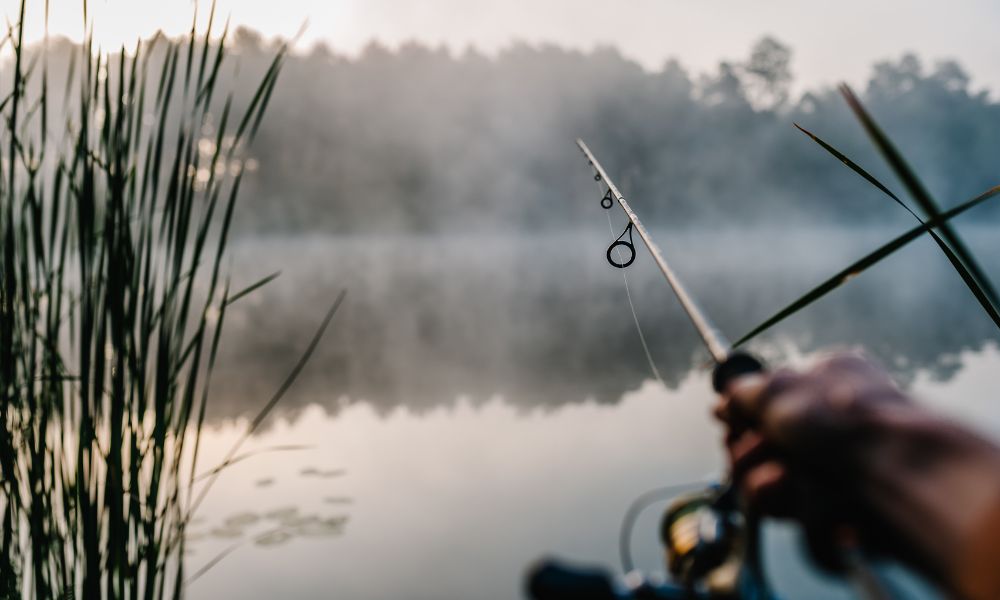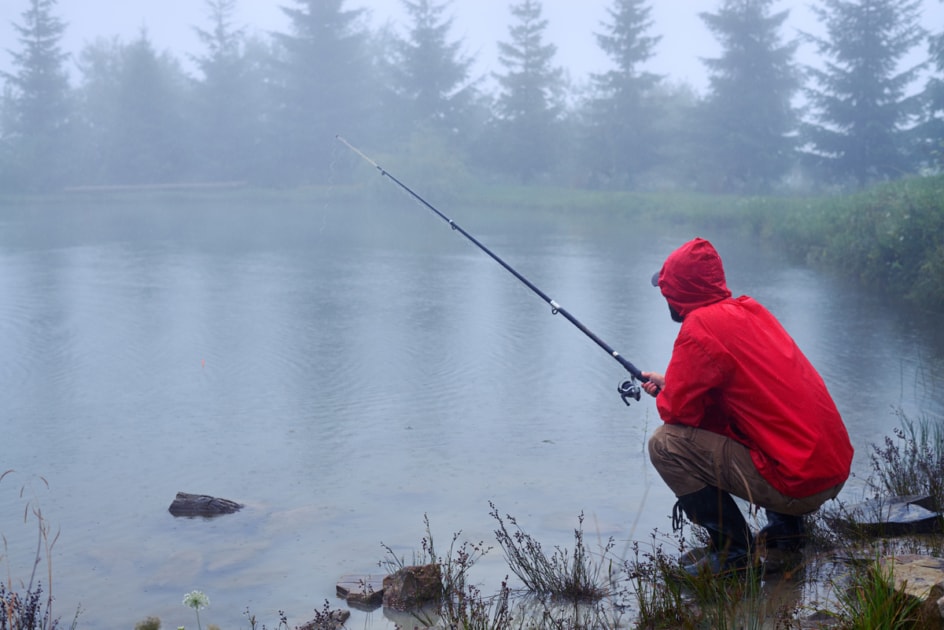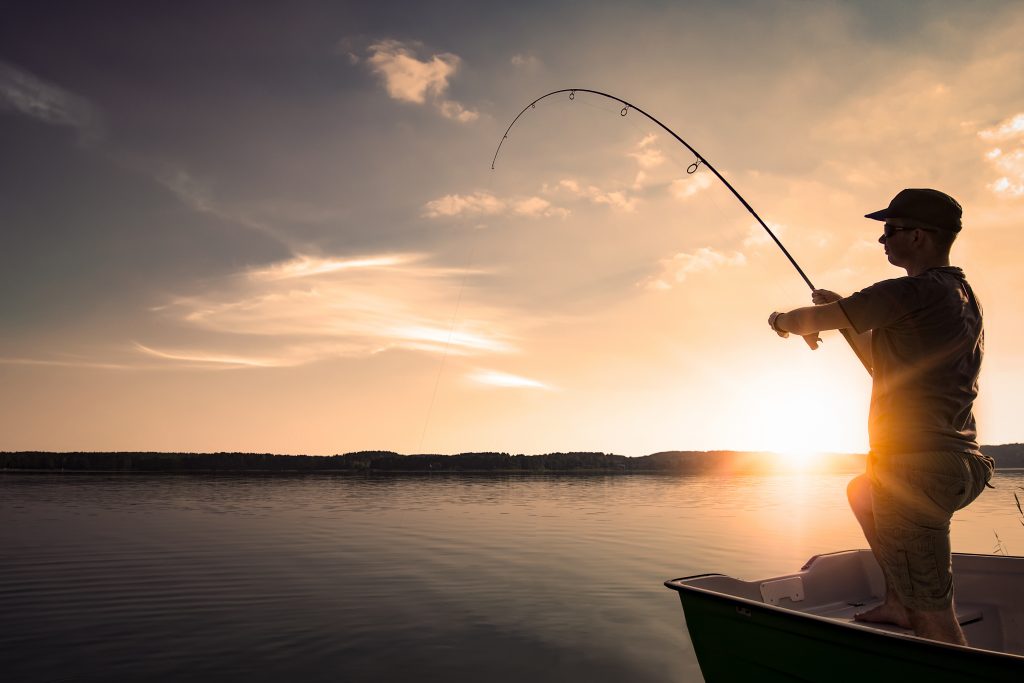Freshwater fishing is a great relaxing hobby or sport and in order to be good at it and consistently catch fish you need to follow a wide range of parameters to familiarize yourself with, like the habitat and baits of the target species and of course, an important rule is when to go. When is the best time to go freshwater fishing?
- Early Morning: fish seeking food
- Late Evening: Similar to morning, cool temp.
- Spring: Spawning season/increased activity
- Summer: Early mornings/evening
- Fall: Fish feeding heavy before winter
- Cloudy Days: Reduced glare, fish less wary
- Before/After Rain: Increased feeding activity
- Season: experiment per species
It’s possible to catch fish in any season. However, some times of the day, month, and year will prove to be more successful than others depending on when you choose to go fishing.
Table of Contents
ToggleWhen is the Best Time to Go Freshwater Fishing
The best time to go freshwater fishing can vary depending on several factors, including the type of fish you’re targeting, the location, and the time of year. Here are some general tips:
- Early Morning and Late Evening: Many anglers find that fish are more active during these times, especially during warmer months. Fish tend to feed more actively during low-light conditions, such as dawn and dusk.
- Seasonal Considerations: Different seasons can affect fish behavior. For example, during the spring, fish may be more active as they prepare for spawning. In the summer, they might seek cooler, deeper waters. Fall can bring increased feeding activity as fish bulk up before winter, and winter fishing might require different techniques to entice sluggish fish.
- Weather Conditions: Pay attention to weather patterns. Fish may be more active before a storm front moves in, for example. Overcast days can also be good for fishing, as they reduce glare and make fish less wary.
- Water Temperature: Fish are cold-blooded creatures, so their activity levels can be influenced by water temperature. Many species become more active when the water temperature is in their preferred range. For example, bass tends to be more active in warmer water.
- Moon Phases: Some anglers believe that certain moon phases can affect fish feeding behavior. While the science behind this is debated, it’s worth considering if you’re planning a fishing trip.
- Research and Local Knowledge: Consult local fishing reports, talk to other anglers, and do some research specific to the body of water you’ll be fishing. Local knowledge can be invaluable in determining the best times to fish in a particular area.
Ultimately, the best time to go freshwater fishing can vary based on a combination of these factors. Experimenting with different times and conditions can help you learn what works best for the species you’re targeting and the location you’re fishing in.
What is the Best Season to Fish Freshwater

The best season for freshwater fishing can vary depending on the location, the species of fish you’re targeting, and your personal preferences as an angler. Here’s a general overview of fishing opportunities in each season:
- Spring:
- Spring is often considered one of the best seasons for freshwater fishing in many regions.
- As temperatures rise and daylight lengthens, fish become more active and begin feeding heavily after the colder months.
- Many fish species, such as bass, crappie, trout, and panfish, spawn during the spring, making them more accessible to anglers.
- Target shallow areas, especially near spawning grounds, and use baits or lures that mimic the prey fish are feeding on.
- Summer:
- Summer can offer excellent fishing opportunities, especially during the early morning and late evening when temperatures are cooler.
- Fish may move to deeper water to escape the heat, so consider targeting deeper holes, underwater structures, and shaded areas.
- Early morning topwater fishing can be productive for species like bass, as they feed near the surface in search of prey.
- Pay attention to weather patterns and fish during cloudy days or when rain is forecasted, as these conditions can increase fish activity.
- Fall:
- Fall is another prime season for freshwater fishing, as fish begin to feed heavily in preparation for the colder months ahead.
- Cooler temperatures can trigger aggressive feeding behavior in many species, including bass, trout, walleye, and pike.
- Look for fish congregating near shallow areas, drop-offs, and underwater structures as they feed on baitfish and other prey.
- Consider using baits or lures that imitate the natural food sources available in the area.
- Winter:
- Winter fishing can be more challenging due to colder temperatures and reduced fish activity, but it can still be rewarding for dedicated anglers.
- Focus on fishing in deeper, slow-moving waters where fish may gather to conserve energy.
- Fish during the warmest parts of the day when water temperatures are slightly higher.
- Target species that are more active in cold water, such as trout, steelhead, and certain types of panfish.
Ultimately, the best season for freshwater fishing depends on factors such as the local climate, the behavior of the target species, and your own preferences as an angler. Experimenting with different seasons and adapting to changing conditions can help you maximize your fishing success throughout the year.
When is it Best Time to Fish Freshwater Before, After, or During a Rain
Fishing before, after, or during a rain can all have their advantages, depending on various factors. Here’s a breakdown of each:
- Before a Rain:
- Fishing before a rain can often be productive, especially if there’s been a period of stable weather leading up to the rain.
- Fish may become more active as they sense the impending change in weather conditions and feed more aggressively to stock up before the rain.
- Additionally, barometric pressure tends to drop before a storm, which can sometimes trigger increased fish activity.

Best Time to Fish Freshwater Before, After, or During a Rain
- During a Rain:
- Fishing during a rainstorm can be challenging due to the discomfort of being out in the rain and the potential danger of lightning.
- However, some anglers find that fishing during light to moderate rain can be surprisingly productive.
- Rain can wash insects and other food sources into the water, triggering feeding activity among fish.
- Additionally, rain can obscure your presence and reduce visibility, making fish less wary and more likely to strike at your bait or lure.
- After a Rain:
- Fishing after a rainstorm can be excellent, especially once the rain has stopped and the weather begins to clear.
- Rain can cause runoff, which carries nutrients and food sources into the water, potentially increasing fish activity.
- Additionally, post-rain conditions often feature cooler temperatures and lower humidity, which can be more comfortable for both anglers and fish.
- As the water levels may rise during and after a rain, fish may move into shallower areas to feed on newly submerged prey, making them more accessible to anglers.
Ultimately, the best time to fish before, during, or after a rain depends on various factors, including the intensity and duration of the rain, the species of fish you’re targeting, and your personal preferences as an angler. It’s always a good idea to exercise caution and check weather forecasts before heading out, especially if you plan to fish during a rainstorm.
When is the Worst Time to Go Fishing?
- If it’s too hot fish don’t eat or move.
- If it’s too cold fish don’t eat or move.
- Rising pressure shuts fish off
- During a rainstorm, most fish hunker down
- The worst time of the day to go fishing is usually around midday & in the early morning hours (1 am. – 5 am.)
- Mid-summer in shallow water …………………………………………………………………………………………read more
What is the Best Tide for Freshwater Fishing
When it comes to freshwater fishing, tides typically don’t have a significant impact compared to saltwater fishing. Tides are caused by the gravitational pull of the moon and the sun on the Earth’s oceans, and while they affect the movement of water in rivers and lakes to some extent, the effect is generally minimal compared to the vast oceans.

However, there are a few scenarios where understanding tides in freshwater fishing can be beneficial:
- River Fishing: In some rivers and estuaries, tidal influences can affect water flow and fish behavior. For example, during incoming tides, fish may move into river systems, especially if they are seeking cooler or warmer water temperatures, oxygen-rich water, or following baitfish.
- Estuaries and Coastal Lakes: In freshwater areas near coastal regions where tidal influences are more pronounced, fishing during incoming or outgoing tides can sometimes be productive. This is because tidal movements can affect water clarity, oxygen levels, and the distribution of baitfish and prey, which in turn can influence where predatory fish are located.
- Fishing Near Dams: In reservoirs or lakes where water levels are controlled by dams, understanding the release schedule of water can be important. While not directly related to tides, the release of water from a dam can create water flow patterns similar to tidal movements, which can impact fish behavior.
In general, while freshwater anglers may occasionally consider the influence of tides on fish behavior, it’s usually not a primary factor in freshwater fishing compared to other variables like water temperature, weather conditions, time of day, and habitat structure. It’s often more important to focus on these factors when planning a freshwater fishing trip.
In freshwater fishing, tides don’t have the same pronounced effect as they do in saltwater environments. However, some anglers believe that fishing during specific phases of the tide cycle can be beneficial, especially in areas where tidal influences are present, such as estuaries, tidal rivers, and coastal lakes.
Here’s a brief overview of each tide phase and its potential impact on freshwater fishing:
- Low Tide:
- Fishing during low tide can sometimes concentrate fish in deeper holes, channels, or structures as water levels recede and fish seek refuge.
- Target areas where fish may be concentrated, such as drop-offs, submerged vegetation, or underwater structures.
- High Tide:
- Fishing during high tide can sometimes flood shallow areas, providing access to new feeding grounds for fish.
- Look for fish moving into newly submerged areas to feed on baitfish, insects, and other prey.
- Slack Tide:
- Slack tide refers to the period of minimal tidal movement between high tide and low tide.
- Fishing during slack tide can be challenging, as fish may be less active during periods of minimal water movement.
- However, some anglers find that fishing near the beginning or end of slack tide can be productive as fish transition between feeding areas.
Ultimately, the impact of tides on freshwater fishing can vary depending on factors such as the location, the species of fish you’re targeting, and local conditions. While tidal influences may not be as significant in freshwater environments compared to saltwater, it’s still worth considering how tides may affect fish behavior and habitat when planning your fishing trips. Additionally, consulting local fishing reports and talking to other anglers familiar with the area can provide valuable insights into the best times to fish based on tidal conditions.
When is the Best Time to Go Fishing?
The best time to go fishing is either early morning or late evening when all fish are active
Within an hour of sunrise
Within an hour after sunset
Between a new Moon and a Full Moon
Two to four hours just before a front arrives ……………………………….read more
What is the Best Moon Phase for Freshwater Fishing
The influence of the moon phase on freshwater fishing is a topic of debate among anglers, with various opinions and theories. While some anglers swear by fishing during specific moon phases, others may not find any significant correlation. However, here’s a general overview of how different moon phases are often perceived in relation to freshwater fishing:
-

Moon Phase Freshwater Fishing Full Moon: Some anglers believe that fishing during a full moon can be productive, especially for species like bass and walleye. The increased light during the night of a full moon may encourage nocturnal feeding activity among fish, making them more active and potentially easier to catch. However, the brightness of the full moon can also make fish more cautious, so fishing during low-light periods like dawn and dusk may still be more effective.
- New Moon: Conversely, fishing during a new moon, when the moon is not visible in the sky, is also popular among some anglers. During this time, darker nights may encourage fish to venture into shallower waters to feed, as they feel safer under the cover of darkness. This can be particularly advantageous for anglers targeting species that are more active in low-light conditions.
- First Quarter and Last Quarter: The periods around the first quarter and last quarter phases of the moon are often considered transitional times, with some anglers finding success during these phases. Fish behavior may vary depending on factors like weather conditions, water temperature, and the specific habitat.
- Moonrise and Moonset: Some anglers pay more attention to the timing of moonrise and moonset rather than specific moon phases. Moonrise and moonset can coincide with periods of increased fish activity, particularly during dawn and dusk. Fishing during these times may enhance your chances of success, regardless of the moon phase.
- Local Factors: It’s essential to consider local factors such as water temperature, weather conditions, and the behavior of the target species in your area. These factors may have a more significant impact on fishing success than the moon phase alone.
Ultimately, while some anglers may have preferences for fishing during specific moon phases, success in freshwater fishing often depends on a combination of factors, including understanding the behavior of the target species, adapting to changing conditions, and employing effective fishing techniques. Experimenting with different moon phases and observing patterns over time can help you determine what works best in your fishing locations.
Conclusion:
In conclusion, freshwater fishing offers a diverse range of opportunities throughout the year, with each season presenting its own advantages and challenges. Whether you’re casting a line in spring, summer, fall, or winter, there are plenty of opportunities to enjoy the sport and connect with nature.
Spring brings the excitement of spawning season, with many species becoming more active and accessible to anglers. Summer offers the chance to fish during early mornings and late evenings when temperatures are cooler, and fish may be more active near the surface. Fall provides prime fishing conditions as fish feed heavily in preparation for winter, while winter fishing offers unique challenges and rewards for those willing to brave the cold.
Regardless of the season, success in freshwater fishing often depends on understanding the behavior of the target species, adapting to changing conditions, and employing effective fishing techniques. Whether you’re casting for bass in a spring-fed lake, fly-fishing for trout in a mountain stream, or jigging for walleye in a river, each fishing excursion is an opportunity for adventure and discovery.
So grab your gear, check the local regulations, and head out to your favorite fishing spot. Whether you’re a seasoned angler or just starting out, there’s always something new to learn and experience on the water. Happy fishing!
When is the Best time to Go Saltwater Fishing?
The best time to go saltwater fishing is typically:
- At dawn or dusk
- When the wind is favorable
- When the weather is favorable
- When tidal movements are favorable
- Especially when the barometric pressure is dropping
- Before a front moves in
- When there is some cloud cover
- After Referencing a Solunar Calander …………………………………………….. Read more

References:
FAQ’s
- What gear do I need for freshwater fishing?
- Basic gear includes a fishing rod and reel, fishing line, hooks, weights, and bait or lures. Additional items like pliers, a tackle box, a landing net, and polarized sunglasses can also be useful.
- What types of fish can I catch in freshwater?
- There’s a wide variety of freshwater fish species, including bass, trout, crappie, bluegill, catfish, walleye, pike, muskie, and many more, depending on your location.
- Where are good freshwater fishing spots?
- Good fishing spots can vary depending on your location. Look for lakes, rivers, streams, ponds, and reservoirs with healthy fish populations and public access. Local fishing reports and recommendations from other anglers can also be helpful.
- When is the best time to go freshwater fishing?
- The best time to fish can depend on factors like the time of year, weather conditions, water temperature, and the behavior of the target species. Early morning and late evening are often productive times, especially during warmer months.
- What are some effective freshwater fishing techniques?
- Techniques vary depending on the species you’re targeting and the fishing environment. Some common techniques include casting with bait or lures, trolling, jigging, fly-fishing, and drift fishing.
- Do I need a fishing license for freshwater fishing?
- In most locations, yes, you’ll need a fishing license to legally fish in freshwater. License requirements vary by state or country, so be sure to check the regulations for the area where you’ll be fishing.


